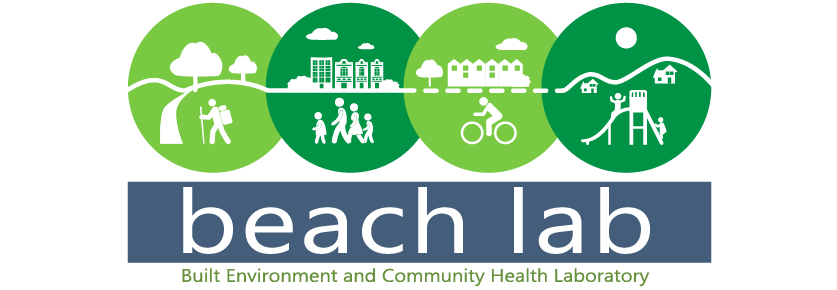In November 2023, several members of the BEACH Lab made the short drive to Atlanta to represent USC at the American Public Health Association (APHA) Annual Meeting. We attended numerous sessions, shared our own research through posters and presentations, and had some fun exploring various neighborhoods and attractions around town.
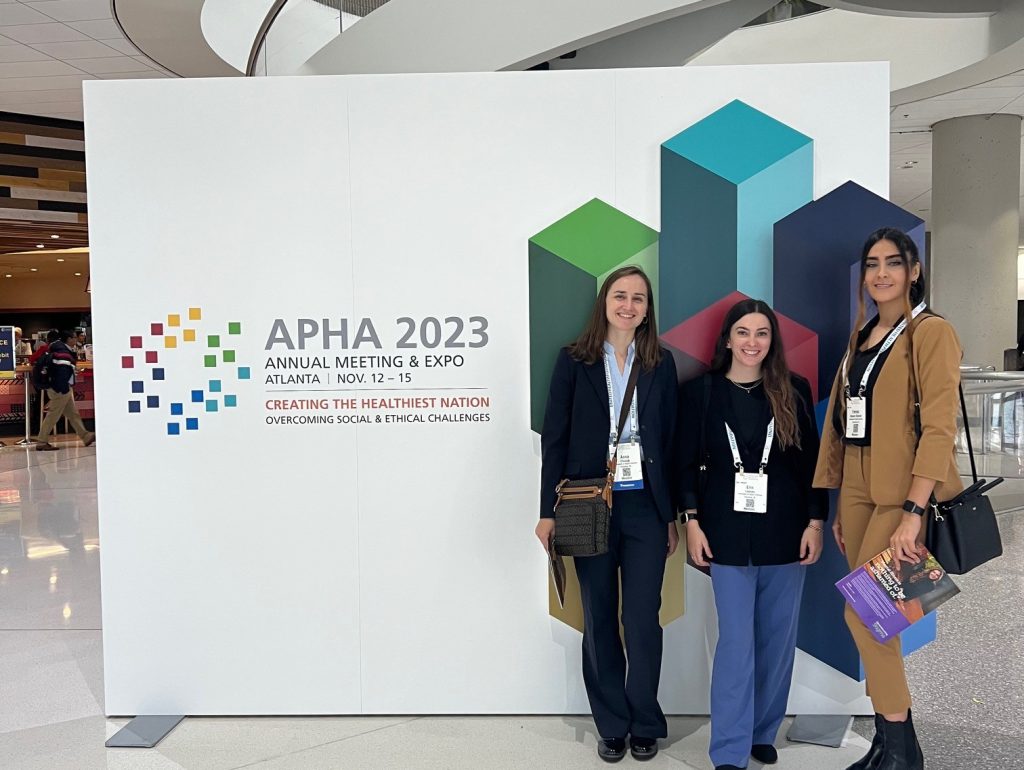
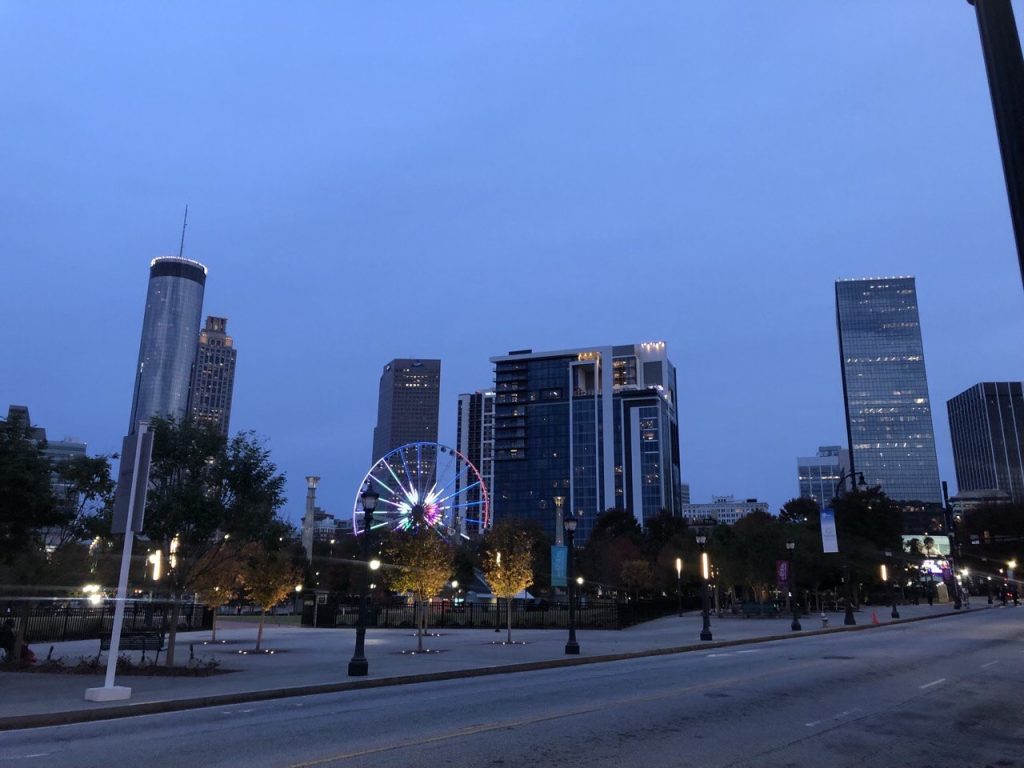
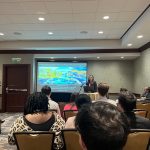 Anna Chupak presented her abstract, Identifying Disparities in the Relationship Between Neighborhood Walkability and Active Transportation Crashes Within South Carolina, as part of the APHA Physical Activity Program. Providing adequate infrastructure supports for active transportation, such as walking and bicycling, in neighborhoods improves walkability, thus promoting physical activity, and reducing chronic diseases like obesity. Furthermore, residents living in disadvantaged neighborhoods are more likely to commute by active transportation and experience a disproportionately higher number of traffic-related fatalities compared to less disadvantaged neighborhoods. Anna’s study assessed the disparities in pedestrian and bicyclist crashes as predicted by availability of walkability supports within South Carolinian neighborhoods at the census tract level. She also examined the relationship between neighborhood walkability and active transportation crashes varying by neighborhood disadvantage. Neighborhood disadvantage was determined by measuring social vulnerability of each census tract, defined as the negative effects on communities caused by external stresses like natural disasters on human health. Anna found that census tracts with greater active transportation supports for pedestrians and bicyclists were significantly associated with fewer active transportation crashes (pedestrian and bicyclist) per trip, especially within census tracts with greater social vulnerability compared to census tracts with lower social vulnerability. Her findings may help policymakers identify neighborhoods with the greatest need of walkability supports (i.e., neighborhoods within census tracts with greater social vulnerability and inadequate walkability infrastructure). For example, her findings may help inform the initiative Vision Zero, which aims to eliminate all traffic fatalities and severe injuries, thus creating more equitable and safe environments for all.
Anna Chupak presented her abstract, Identifying Disparities in the Relationship Between Neighborhood Walkability and Active Transportation Crashes Within South Carolina, as part of the APHA Physical Activity Program. Providing adequate infrastructure supports for active transportation, such as walking and bicycling, in neighborhoods improves walkability, thus promoting physical activity, and reducing chronic diseases like obesity. Furthermore, residents living in disadvantaged neighborhoods are more likely to commute by active transportation and experience a disproportionately higher number of traffic-related fatalities compared to less disadvantaged neighborhoods. Anna’s study assessed the disparities in pedestrian and bicyclist crashes as predicted by availability of walkability supports within South Carolinian neighborhoods at the census tract level. She also examined the relationship between neighborhood walkability and active transportation crashes varying by neighborhood disadvantage. Neighborhood disadvantage was determined by measuring social vulnerability of each census tract, defined as the negative effects on communities caused by external stresses like natural disasters on human health. Anna found that census tracts with greater active transportation supports for pedestrians and bicyclists were significantly associated with fewer active transportation crashes (pedestrian and bicyclist) per trip, especially within census tracts with greater social vulnerability compared to census tracts with lower social vulnerability. Her findings may help policymakers identify neighborhoods with the greatest need of walkability supports (i.e., neighborhoods within census tracts with greater social vulnerability and inadequate walkability infrastructure). For example, her findings may help inform the initiative Vision Zero, which aims to eliminate all traffic fatalities and severe injuries, thus creating more equitable and safe environments for all.
Furthermore, Anna thoroughly enjoyed conversing with other researchers and public health professionals about topics related to disparities in physical activity and health outcomes, such as community health disparities due to geographical location. Anna also attended a variety of fascinating seminars and poster presentations, such as a presentation on climate change denialism, a live podcast on public health and technology, a discussion with the filmmaker of Shot in the Arm, which explores vaccine hesitancy during the COVID-19 pandemic, and a session on the future of incorporating artificial intelligence in public health interventions. Outside of the conference, Anna took delight in walking along the Belt Line with her colleagues from the BEACH Lab after grabbing a quick bite at the vibrant and historic Ponce City Market. The Belt Line comprises 22 miles of former railroad tracks circling the core of Atlanta and connects outer neighborhoods to parks, greenspaces, dining, and entertainment. The Belt Line exemplifies a superb and beautiful use of greenspace, fostering physical activity and connectivity among communities within Atlanta.
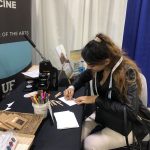 Farnaz Hesam Shariati created a presentation about the effect of the built environment on preventing the progression of Parkinson’s disease, titled “Designing environments that contribute to a reduction in the progression of Parkinson’s disease: Literature review,” as a part of the APHA Emerging Scholars Plus program. This systematic review extracted evidence from studies between 2005 and 2022 regarding built environment impacts on reducing PD progression, showing that regular exercise (provided opportunities by walkable neighborhoods) and exposure to enriched environments are crucial to managing symptoms.
Farnaz Hesam Shariati created a presentation about the effect of the built environment on preventing the progression of Parkinson’s disease, titled “Designing environments that contribute to a reduction in the progression of Parkinson’s disease: Literature review,” as a part of the APHA Emerging Scholars Plus program. This systematic review extracted evidence from studies between 2005 and 2022 regarding built environment impacts on reducing PD progression, showing that regular exercise (provided opportunities by walkable neighborhoods) and exposure to enriched environments are crucial to managing symptoms.
In addition, Farnaz experienced her first conference, met many experts, attended inspiring workshops and seminars, and visited numerous presentations. She luckily found a research hub called “The Center for Arts in Medicine,” from the University of Florida, focusing on a disciplinary realm connecting art and public health. It inspired Farnaz with an idea indicating that “access to art is a social determinant of health!” Another interesting agenda was related to aging and public health, focusing on sustainable strategies for promoting brain health, specifically dementia. The presentation included a road map regarding the Healthy Brain Initiative (HBI) and outlined efforts to reduce the risk of dementia and increase public awareness regarding symptoms, early detection, supporting caregivers, etc. Another helpful program that Farnaz attended was the “Physical Activity and Environmental Collaboration Session.” The presentation titled “Housing affordability and pedestrian-oriented zoning code reforms: analysis of a new Housing Affordability Index” was the most interesting one for her.
Besides, Farnaz had an enjoyable time with her fantastic advisor, Dr. Kaczynski, and her lovely team members of the Beach lab (also her incredible friends), and she met lots of people from different sectors at a social event related to the Arnold School of Public Health (USC). She also had a chance to meet her old friend and shared many new ideas regarding intersecting machine learning and current Beach lab research interests! Walking in Atlanta downtown, taking photos in front of the Mercedes-Benz factory (her dreamy car), eating delicious dishes at Rumi (a Persian restaurant), and hanging out at Belt Line and Ponce City Market thrilled her and helped her to engage more in diverse communication!
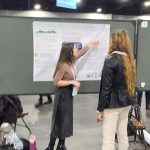 Erin Looney presented a poster on “Exploring disparities in fine particulate matter (PM2.5) exposure according to social vulnerability in South Carolina from 2000-2018” on the Student Achievement Award Poster Track at APHA. This was her first conference, and she had so much fun – Erin is already planning for the next one (see you soon, Minneapolis)! She learned about conference culture, air quality and health, vaccine hesitancy, and AI and public health, just to name a few. Outside the conference, Erin socialized with tons of people, from USC alumni to international public health practitioners!
Erin Looney presented a poster on “Exploring disparities in fine particulate matter (PM2.5) exposure according to social vulnerability in South Carolina from 2000-2018” on the Student Achievement Award Poster Track at APHA. This was her first conference, and she had so much fun – Erin is already planning for the next one (see you soon, Minneapolis)! She learned about conference culture, air quality and health, vaccine hesitancy, and AI and public health, just to name a few. Outside the conference, Erin socialized with tons of people, from USC alumni to international public health practitioners!
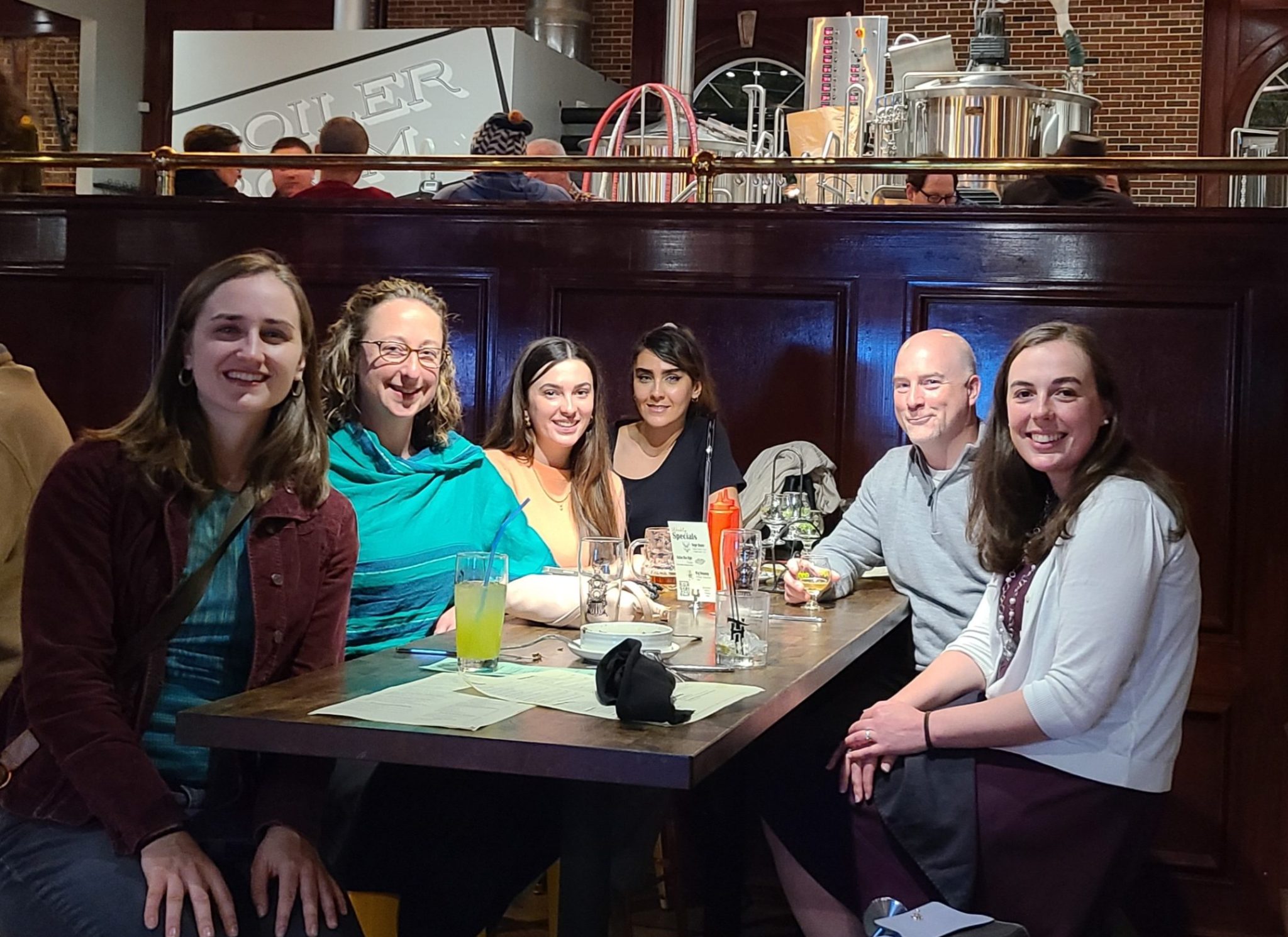
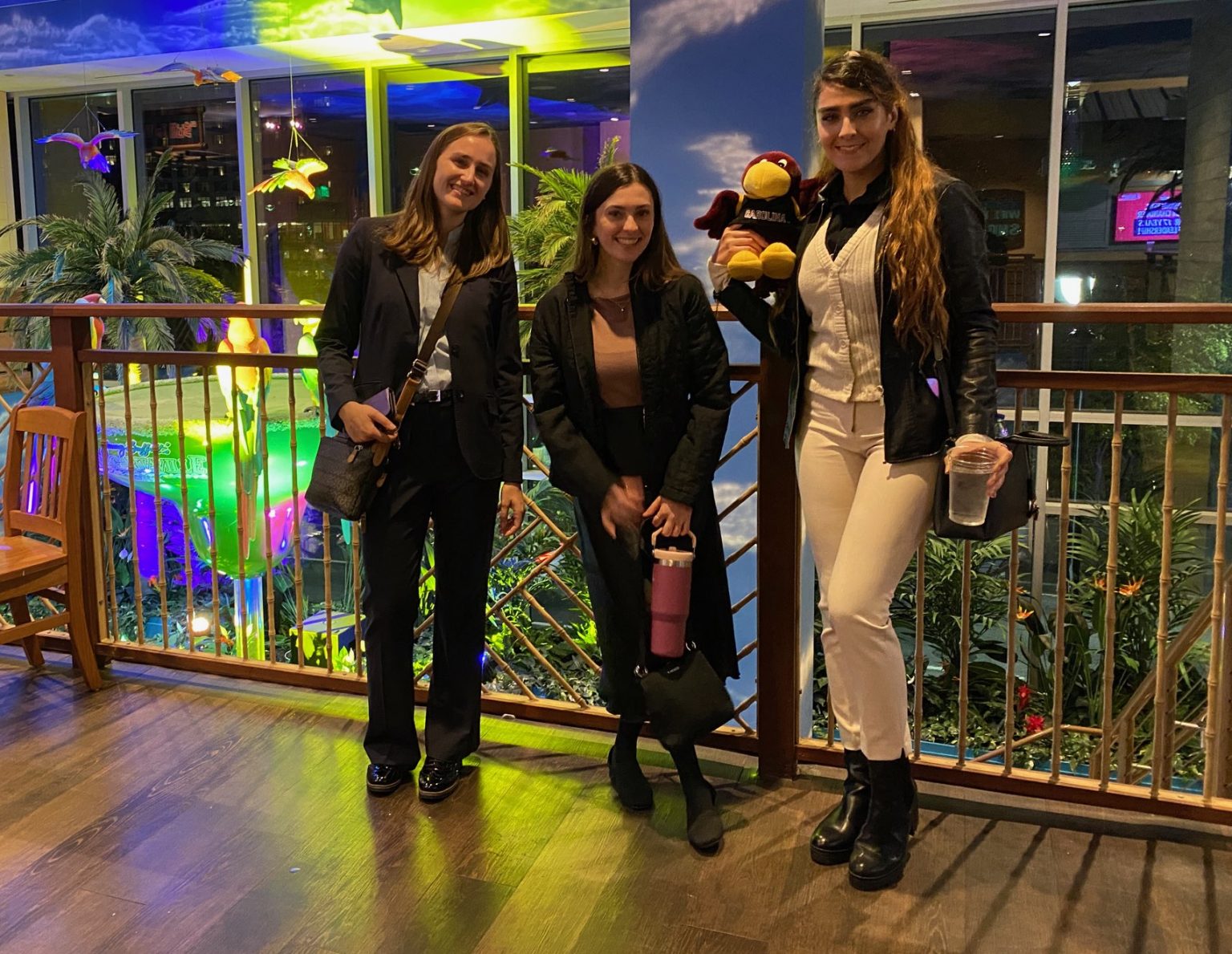
The BEACH Lab crew also found time for a little fun. We attended the Arnold School of Public Health social event at Margaritaville where Dean Chandler was honored for his 17 years of service, and numerous current and former students and faculty were there to network and celebrate. At Torched Hop brewery, we also had a mini-reunion with several former BEACH Lab students – Melissa Fair, Kara Davis, and Sarah (King) Given. It was great to share stories and hear about all the amazing work they are doing in their current academic and professional positions. On our last evening, we ventured out to Ponce City Market for some tasty international cuisine and a moonlit stroll along the adjacent Beltline. It was great to see and experience this popular multi-use trail and all the mixed-use residential and commercial amenities that are popping up all along it.
It was a fun and rewarding conference trip overall and we look forward to the next opportunity to share our research and learn from others who are advancing public health.
